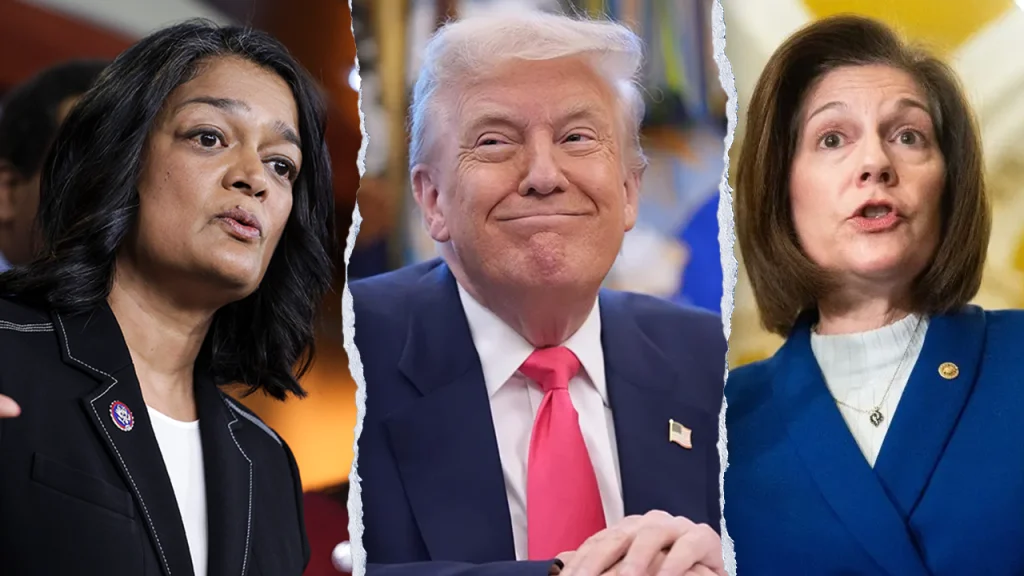Listen to the article
Democratic lawmakers are dismissing the stock market’s success under President Donald Trump, arguing that market performance doesn’t reflect everyday economic realities faced by Americans. When questioned about why markets remain strong despite their warnings about tariffs, several Democrats pushed back against using stock indices as an economic barometer.
“The stock market is not the economy,” responded Senator Catherine Cortez Masto (D-Nevada) when asked about the apparent contradiction. She maintained that Americans “are feeling price crunch when they go to the grocery store,” and insisted that “tariffs are taxes on Americans” directly contributing to higher costs.
Representative Pramila Jayapal (D-Washington) offered a more pointed critique, suggesting the market’s strength only reflects how “billionaires are continuing to do well.” She attributed stock performance to corporate tax policies, claiming, “Corporations got massive tax breaks, $7 billion in tax breaks in the big, bad betrayal bill. That’s why the stock market’s doing well.”
This disconnect between Wall Street and Main Street was echoed by Senator Angela Alsobrooks (D-Maryland), who emphasized that “no matter what the stock market is saying, [Americans] are seeing the cost of groceries have not gone down. They are seeing that health care costs have become really exorbitant.”
Senator Chris Murphy (D-Connecticut) was equally direct, stating, “The stock market matters to a lot of folks, but prices matter the most to people. And right now, people are hurting because of Trump’s economic policies, including the tariffs.”
The administration has pushed back firmly against these characterizations. White House Press Secretary Karoline Leavitt recently urged Americans to “TRUST IN TRUMP,” claiming that the president’s “pro-growth policies are a proven formula to Make America Affordable Again.” She pointed to falling prices in various food categories and blamed the Biden administration for “the worst inflation crisis in modern American history.”
Republican lawmakers have defended the president’s trade strategy as necessary for long-term economic health. Senator John Hoeven (R-North Dakota) argued that Democrats “are missing” the bigger picture of Trump’s efforts to “get a level playing field” in international trade. “You have to separate the short term from what’s going to happen over time,” Hoeven explained, adding that the president’s first-term approach “ended up with huge sales to China and other places.”
Not all Democrats oppose Trump’s trade policies uniformly. Senator John Fetterman (D-Pennsylvania) expressed selective support, saying, “I agree with some of the tariffs, especially with like China.” However, he distinguished between appropriate targets, noting his opposition to “going after Canada and our allies,” while acknowledging that for industries like steel, tariffs may be justified.
The debate highlights the complex relationship between trade policy, consumer prices, and market performance. While Republicans frame tariffs as strategic leverage to secure better international trade terms, Democrats contend they function as regressive taxes that disproportionately impact working Americans through higher consumer prices.
As the discussion continues, Senator Richard Blumenthal (D-Connecticut) perhaps best captured the unpredictable nature of market reactions to policy changes: “One thing I’ve learned is not to try to predict or analyze the stock market.”
The ongoing disagreement underscores the challenge in measuring economic success – whether through stock indices that benefit investors or consumer prices that affect everyday Americans’ purchasing power – and reflects fundamentally different philosophies about how trade policies impact different segments of the economy.
Fact Checker
Verify the accuracy of this article using The Disinformation Commission analysis and real-time sources.




8 Comments
It’s an interesting debate around using the stock market as a barometer of economic health. Lawmakers make some fair points about how the benefits may be concentrated at the top, even as the broader market indices are soaring. Reconciling those divergent trends is an ongoing challenge.
Lawmakers are right to be skeptical of using the stock market as the sole measure of economic well-being. While the market’s strength is undeniable, the question of how much that translates to the experiences of average Americans is a valid one that deserves scrutiny. These are complex issues without easy answers.
The disconnect between Wall Street and Main Street is a fascinating dynamic to unpack. While the stock market may be booming, lawmakers raise important points about how that doesn’t necessarily reflect the day-to-day economic realities facing many Americans. It’s a nuanced issue without simple solutions.
The stock market’s strength under the Trump administration is certainly a complex issue without easy answers. While lawmakers raise valid concerns about how that may not reflect the experiences of many Americans, it’s also true that the economy and markets are multifaceted. Reasonable people can debate the nuances.
The stock market’s performance is a complex issue without easy answers. While it’s undeniably strong, the question of how much that reflects the experiences of average Americans is a valid one. Lawmakers seem to be grappling with the challenge of reconciling those divergent trends.
You’re right, it’s not a simple black-and-white issue. There are likely multiple factors at play, from policy decisions to global economic forces. Reasonable people can disagree on how to interpret the data and what it means for everyday Americans.
This is a great example of how economic indicators don’t always tell the whole story. Just because the stock market is booming doesn’t mean the average person is necessarily feeling the benefits. Lawmakers raise some important points about the disconnect between Wall Street and Main Street.
It’s interesting to see the disconnect between the strong stock market and the economic realities facing many Americans. While the market may be booming, it doesn’t always reflect the struggles of everyday people dealing with higher costs and prices. Lawmakers raise some valid points about how the benefits may be concentrated at the top.